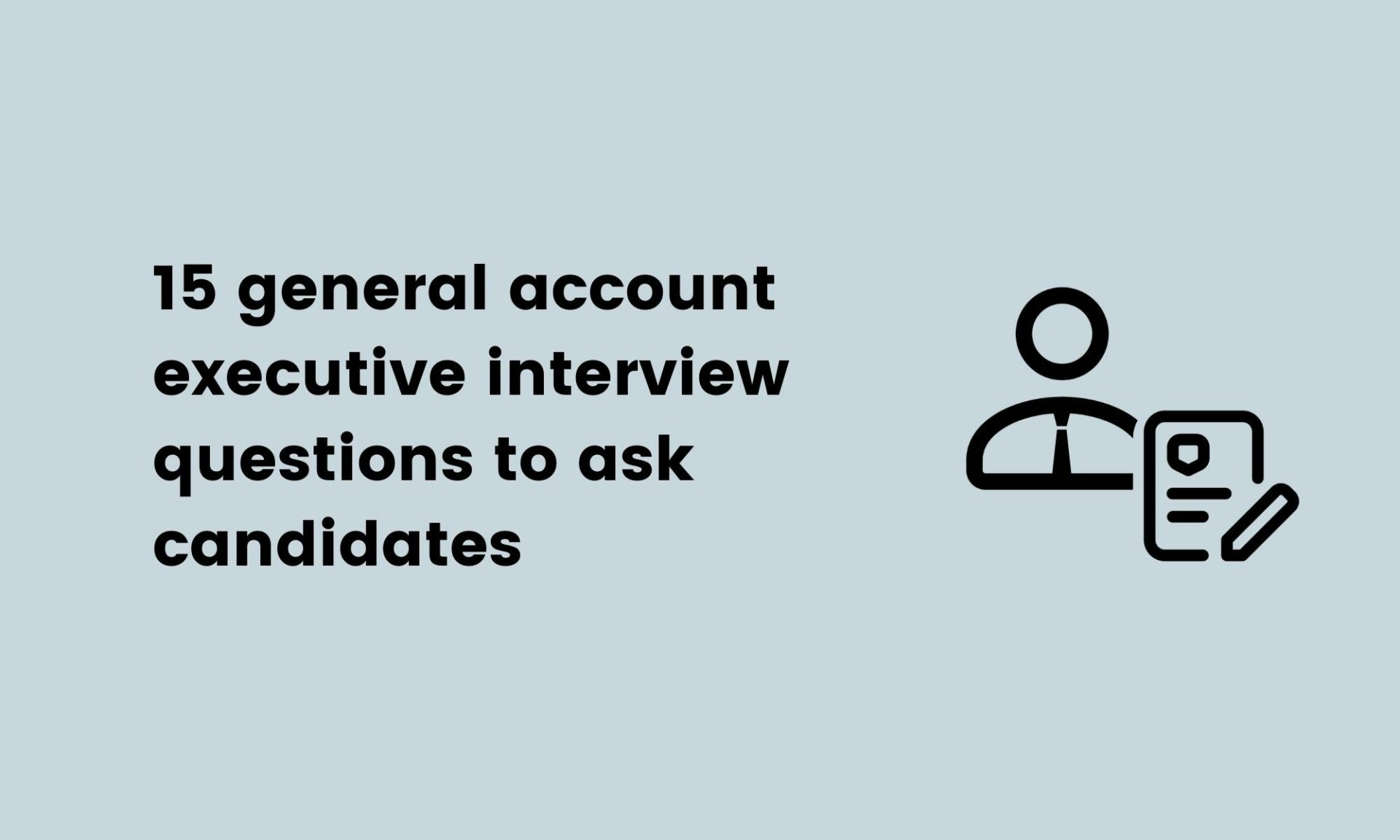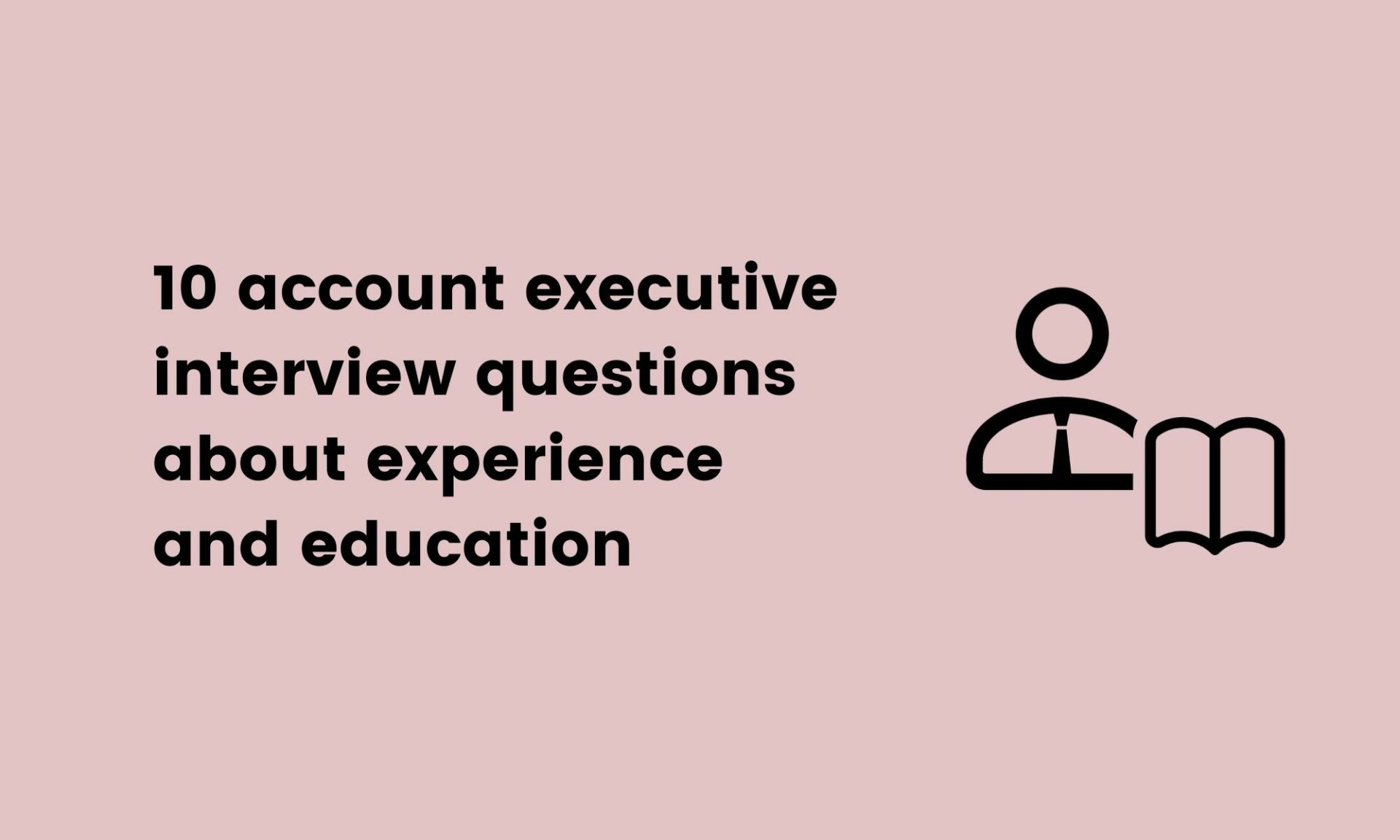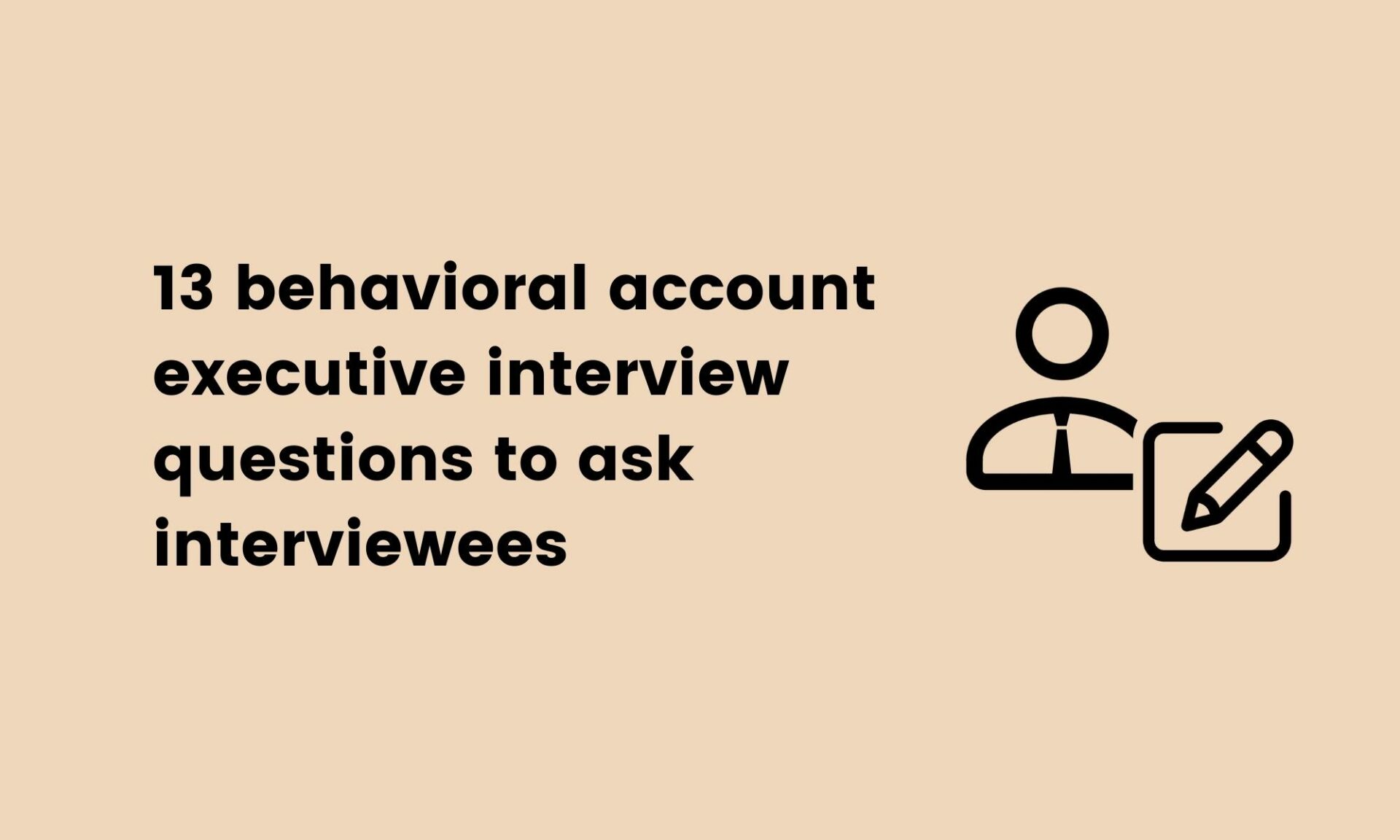38 account executive interview questions that you as a recruiter should ask your next candidate
Are you looking for a superstar applicant to become your next account executive?
It’s not easy.
Plenty of critical skills can make a significant difference to the success of your next new hire; so, how can you determine whether your candidates have the skills specified in your account executive job description?
A couple of methods stand out, actually.
The first is skills testing: Check out our Account Management skills test to see how easy it can be to review several account executive sub-skills all at once. You can combine this test with others to create a comprehensive assessment of your applicants and see who truly stands out and should be interviewed.
Interviewing enables you to learn more about your candidates and gain an in-depth understanding of their abilities and strengths.
In this article, we have compiled 38 account executive interview questions to help you hire your next account executive.
Check out the list below to begin building your own.
Table of contents
- 15 general account executive interview questions to ask candidates
- 5 general account executive interview questions and answers
- 10 account executive interview questions about experience and education
- 5 account executive interview questions and answers about experience and education
- 13 behavioral account executive interview questions to ask interviewees
- 5 behavioral account executive interview questions and answers
- At which stage of the hiring process should you use these account executive interview questions?
- 3 reasons to consider skills testing as part of the hiring process
- Review, appraise, and onboard applicants with skills tests and the right interview questions
15 general account executive interview questions to ask candidates
These 15 general account executive interview questions are best used at the beginning of the interview and enable you to learn about your applicants’ general skills and capacity for self-reflection.
Ask these questions to see whether their experience matches your needs.
How would your co-workers describe you?
List four adjectives your boss would use to describe you.
What is your key motivation for seeking to join our organization?
What motivated you to choose a career as an account executive?
Have you researched our organization? What challenges do you foresee if you were to join us?
Which action plans would you hope to initialize within the first 1-3 months of joining us?
Name your three main strengths as an account executive.
Name your main weakness as an account executive.
Which skills do you consider the most critical for account executives?
Which soft skills do you consider are the most crucial for account executives?
Which skills are you trying to perfect as an account executive?
Why have you decided to leave your current role?
Describe your values as an account executive.
What do you aim to have accomplished in three years?
Name three best practices account executives should adhere to in their work.
5 general account executive interview questions and answers
If you’re looking for answers to the most critical account executive interview questions from the list above, in this section we’ve included five. Use the sample answers to review your applicants’ responses.
1. Name three best practices account executives should adhere to in their work.
Listening to a client’s needs, asking the right questions, and offering the right value to clients are three critical best practices your applicants should be able to outline when responding to this interview question.
Can they also explain that letting clients know the advantages of their service while avoiding excessive sales pressure is another best practice that’s beneficial to the client and the business?
2. Which skills do you consider the most critical for account executives?
Can your applicants name a couple of critical skills that they use every day? There are various skills that account executives should have, which make their work easier.
In addition to negotiation, having the right presentation skills for sales pitches and being able to explain information clearly and concisely to prospects is essential.
3. Which soft skills do you consider are the most crucial for account executives?
Many soft skills are critical for account executives and make it easier for them to achieve their targets and goals.
Can they explain that communication skills are essential for closing deals successfully? Do they know that problem-solving is also vital because it enables them to address their clients’ challenges and find the right solutions?
You may want to review your candidate’s skills in these areas, too. For this, consider our Communication skills test and Problem-solving skills test.
4. Which skills are you trying to perfect as an account executive?
Applicants might not fulfill all the criteria or have every skill you’re looking for; however, it’s important to hire someone who’s always looking to improve their account executive skills.
Whether trying to perfect their leadership skills or become better at organizing their workload, they must be trying to get better. Ask follow-up questions to find out how exactly they are working on these skills.
For example, a candidate may be taking part in management courses or working with team members to help them handle clients and perfect their leadership skills. If you’re looking for ways to appraise these abilities, check out our Leadership & People Management skills test.
5. Describe your values as an account executive.
When responding to this interview question, some of the values your applicants may list include putting clients first, being ethical when communicating with clients, providing the best value compared with competitors, and trying to help clients achieve their objectives. Applicant’s answers to this question will help you determine whether their values align with those of your business.
The best insights on HR and recruitment, delivered to your inbox.
Biweekly updates. No spam. Unsubscribe any time.
10 account executive interview questions about experience and education
The 10 account executive interview questions in this section will help you learn about your applicants’ professional experiences.
Ask your candidates these questions to build on what you’ve learned about them.
Describe your current responsibilities as an account executive.
Which milestones have led you to take on the position of account executive?
Describe your biggest successes during your career as an account executive.
Is using social media important for finding prospects? Do you have experience with this?
Have you faced any complications or challenges as an account executive?
Which methods do you use to enhance your account executive skills?
Which factors motivate you each day to achieve your goals and complete tasks?
Describe your sales experience.
Why are leadership skills essential for account executives? Describe your leadership experience.
How do you stay organized as an account executive?
5 account executive interview questions and answers about experience and education
Need sample answers to some of the most important executive interview questions about experience and education?
Check out the five sample answers below and use them as a guide to review your account executive responses.
1. Is using social media important for finding prospects? Do you have experience with this?
Social media is an effective and widely-used method for building client connections and is ideal for generating leads.
Applicants should know how useful social media can be for account executives. Do they have the right experience with social media? Do they consistently dedicate a certain amount of time to building connections and engaging with them?
2. Why are leadership skills necessary for account executives? Describe your leadership experience.
Not only can leadership skills assist account executives with making complex decisions, but they are also vital for interacting with prospects and clients.
Do your applicants have leadership or management experience? For instance, they may have worked as a team leader to oversee their team’s work, which has prepared them to take on a leadership role in the future.
3. Describe your current responsibilities as an account executive.
How well is your applicant able to explain their current responsibilities and how they relate to the company’s mission?
Candidates may list responsibilities such as direct client work, lead finding, sales closing, client support, strategy formulation, and communicating with clients about product value. Can they explain why each of these responsibilities is important?
4. Have you faced any complications or challenges as an account executive?
Applicants may have faced various challenges as account executives. For example, your candidate may have had a client who was frustrated with a particular service and wanted to move to a competitor. You should aim to find out the methods they used to solve such challenges.
One example of such methods includes using persuasive arguments or trying to match the competitor’s services to retain the client.
5. Describe your biggest successes during your career as an account executive.
From client retention to increasing sales, there are various success stories your applicants may mention when responding to this account executive interview question.
Consider the process they followed to achieve success. Do they use a new and creative approach? Are they sales innovators? Consider whether they would be an asset to your team for their results and methods.
13 behavioral account executive interview questions to ask interviewees
The 13 behavioral account executive interview questions in this section are ideal for learning how your applicants behave when handling challenging account executive tasks.
Ask your applicants these questions to learn more about them.
Which methods do you use to discover sales opportunities?
Describe a time you disagreed with a team member.
What is your method for pursuing success as a leader and account executive?
Describe a time your client told you they were searching for new suppliers.
Which methods do you use to close challenging deals?
Have you ever had to work with a client who was unhappy with your account executive’s services?
How would you rate your problem-solving skills? Describe a time you solved a multi-step, challenging problem.
How would your boss rate your communication skills? Describe a time you communicated effectively with a client or stakeholder.
What would be your strategy for handling multiple client issues simultaneously?
How would you persuade clients to use our services?
Which method would you use to maintain relationships with clients?
Is technology important in sales? What tech do you use in your current role?
How do you stay up to date with the best practices in your field?
5 behavioral account executive interview questions and answers
Searching for sample answers to some of the behavioral account executive interview questions from the previous section?
You’ll find five answers to the most critical questions in the section below. Use them to appraise your prospective employees and determine whether their answers match your expectations.
1. How would you rate your problem-solving skills? Describe a time you solved a multi-step, challenging problem.
It’s normal for applicants to encounter various problems in their work, so they need the right problem-solving skills to solve them. For example, they may have had a chronically unhappy client who was always looking for alternative solutions.
Solving problems like these may require various steps, such as finding out why the client was unhappy, communicating with them, finding a solution to their pain point, and offering a personal touch.
Ensure your applicant’s problem-solving skills match your requirements with our Problem-solving test.
2. How would your boss rate your communication skills? Describe a time you communicated effectively with a client or stakeholder.
Communication skills are critical for engaging with clients in person, through social media, or during video calls, you should never overlook this skill. Take note of how your applicants use their communication skills to resolve issues.
For example, your candidate may have had to clarify stakeholders’ objectives and goals over several calls. In this situation, you may want to check whether they have used active listening to fully understand what’s at stake and how to best approach the task.
3. Have you ever had to work with a client who was unhappy with your account executive services?
Your applicants may talk about different situations in which clients were unhappy with their account executive services. The key is to ensure they use smart methods to retain them.
For instance, if a client is unhappy due to missed deadlines, your applicant must understand the importance of active listening and empathy to resolve the issue – and be able to commit to meeting deadlines in the future.
4. Is technology important in sales? What tech do you use in your current role?
Technology plays a vital role in sales, expanding the reach of businesses and the scope of their presence. Social media is one example of such technology, and so are CRMs (such as HubSpot and Salesforce).
Find out whether your applicants understand why technology is critical in sales by asking them this account executive interview question.
5. Which method would you use to maintain strong relationships with clients?
Your applicants may mention that maintaining strong client relationships requires effective communication.
Active listening to understand clients’ needs, clear verbal communication to inform clients about their services, and clear written communication are all essential for establishing and keeping client relationships.
At which stage of the hiring process should you use these account executive interview questions?
The best time to use these account executive interview questions is after you’ve sourced candidates, asked them to complete a skills assessment, received the assessment results, and shortlisted suitable applicants for an interview.
The interview phase should always follow skills testing for three key reasons:
1. Asking applicants to complete skills tests first will make your hiring process more objective
When you use skills tests before interviews, the data does the talking, meaning that you don’t have to rely on a gut feeling. Shortlisting applicants with skills tests is much fairer and more objective than a resume or CV screening, which is an outdated and biased approach.
2. Using skills tests before the interview will reduce your time to hire
Choosing between two equally-skilled applicants can lead to a longer time to hire.
With skills testing, there’s no need to worry about complications like these – your decision-making process will be data-driven and more efficient, making it also faster as a result. You’d simply need to look at applicants’ test scores to see who would be a better fit for the job.
3. You can get ideas for extra account executive interview questions from skills testing
If you need more inspiration for unique questions, you can check the test results before you start the interview and add questions to your list to learn more about your applicants.
3 reasons to consider skills testing as part of the hiring process
There are also a few extra reasons to consider skills testing as part of the hiring process, which include:
1. Skills testing can help you evaluate several skills simultaneously
A top skills testing provider like TestGorilla is all you need to simultaneously appraise different skills and abilities. You need to create an assessment with up to five tests corresponding to the skills you want to review.
For example, you may choose the Account Management test and pair this with a Communication test, a Problem-Solving test, a Critical Thinking test, or a Leadership test. You can select several tests to ensure your process is thorough and efficient.
2. Skills testing can help with the onboarding and training process
Onboarding and training woes no longer need to block your path to hiring a professional account executive for your business and helping them get up to speed. That’s right: skills tests can also help onboard candidates.
After consulting your applicants’ weaker skills (such as their negotiation skills, for example), you can note this as a benchmark from which your applicants should seek to improve.
With the benchmarks in mind, you can then set up appropriate account executive training sessions for your new hires. If you want to check how they’re advancing, you may even choose to request your new hire to take another skills test and then readjust the training sessions accordingly.
3. Skills testing is a comprehensive method that can replace resume screening
Getting bogged down in resume screening can be overwhelming. If you receive hundreds of applications, you may be unable to work through the entire stack of resumes alone.
Need a stress-free hiring method?
Skill testing to the rescue! You don’t even have to screen resumes when you use assessments – it’s a faster, bias-free, and more efficient way to shortlist applicants.
Review, appraise, and onboard applicants with skills tests and the right interview questions
All you need to successfully review, appraise, and onboard applicants are described in this article. All the hiring challenges you may have encountered in the past no longer need to stand in your way.
Visit our platform, TestGorilla, to view our Account Management skills test. Shortlist the best applicants based on their results.
And finally, use the account executive interview questions we’ve provided above to assess your candidates thoroughly.
Use skills assessments and the right interview questions to hire world-class account executives for your team. Sign up for a TestGorilla free plan.
You've scrolled this far
Why not try TestGorilla for free, and see what happens when you put skills first.

















